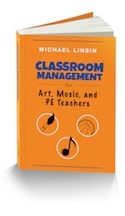In order to create that kind of a learning environment, I have found that the following items must be a part of my classroom: 1) a clearly stated set of expectations and routines, 2) cooperative learning experiences, and 3) opportunities for students to have input into class and create music in which THEY make the choices, not me.
Expectations
I have created many sets of expectations over the years, but I really believe that the fewer you have, and the more positively stated they are, the better.
Here are mine:
We review these rules often, and talk about why they are so important.
So, what if a kiddo breaks a rule? First, I give a general reminder to the whole class about what's supposed to happen. If a child continues, then I give him/her a gentle warning. For instance, "Jim, (or whomever) the expectation is that you are listening, rather than talking, right now. Can you do that?" Typically, the child says yes. If they continue, then they to go to the "think spot." Usually, that takes care of it, but if I find that they are going to the think spot repeatedly, then I might try changing their assigned sitting spot in the room, a one-on-one conference, and/or a call home to their parents/guardians.
Routines
Kids thrive on routines! My routine is simple. We enter the room quietly and safely, and go to our "music spots." Then, we look at the SMARTboard where I list the activities for the day. I typically start with a body and/or vocal warm-up, then we learn a song or piece of repertoire that focused on a particular pitch or rhythmic concept. Within the class period, I try to have kids singing, moving, listening, and creating.
At the end of class, I call of small groups of students to line up (if your wearing blue, or if you sit in the 3rd row, etc.). This cuts down on a lot of silliness, and kids line up ready to go on to their next class! Classroom teachers very much appreciate the fact that kids are calm and ready to go.
Resources
One of my favorite resources for classroom management ideas is this book:
I love that it is specific to "specialists" classroom, because, like it or not, our teaching scenario is different! The author also has a website called www.smartclassroommanagement.com, that I would highly recommend. Check it out!





